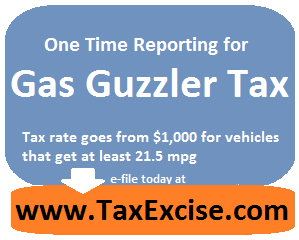 The Gas Guzzler Tax is a Federal excise tax applied to the domestic sale of new vehicles that don’t meet certain fuel economy standards. It was enacted as part of the Energy Tax Act of 1978, reaching current levels by 1988. On its surface, the Tax is simple. Behind that simplicity, though, lies a maze of formulas and numbers, some of which are of particular interest to SUV buyers.
The Gas Guzzler Tax is a Federal excise tax applied to the domestic sale of new vehicles that don’t meet certain fuel economy standards. It was enacted as part of the Energy Tax Act of 1978, reaching current levels by 1988. On its surface, the Tax is simple. Behind that simplicity, though, lies a maze of formulas and numbers, some of which are of particular interest to SUV buyers.
The Gas Guzzler Tax is based on combined fuel economy, which is based on a 55%/45% highway/city fuel economy estimate from the Environmental Protection Agency test.
How Much is the Gas Guzzler Tax?
Vehicles that get at least 22.5 mpg (combined) don’t have to pay the Gas Guzzler Tax. The Tax rate goes from $1,000 for vehicles that get at least 21.5 mpg (combined), but less than 22.5 mpg (combined) all the way up to $7,700 for vehicles that get less than 12.5 mpg (combined).
What’s New
The definition of automobile for purposes of the gas guzzler tax has been revised. Limousines with a gross unloaded vehicle weight of greater than 6,000 pounds are not subject to the gas guzzler tax, effective for sales, uses, or leases after September 30, 2005.
Purpose of Form
Use Form 6197 to figure the gas guzzler tax. The gas guzzler tax is imposed on the sale, use, or lease by the manufacturer or importer of an automobile of a model type that does not meet certain standards for fuel economy. Automobiles imported for business or personal use are subject to the tax.
The tax liability is figured each quarter and reported on Form 720. See the Instructions for Form 720 for information on how to file and make deposits.
If you import a gas guzzling automobile, you may be eligible to make a one-time filing for which no employer identification number is needed and no deposit is required.
One-Time Filing
If you import a gas guzzling automobile, you may be eligible to make a one-time filing of Form 720 and Form 6197 if you meet both of the following conditions:
• You do not import gas guzzling automobiles in the course of your trade or business and
• You are not required to file Form 720 reporting excise taxes for the calendar quarter, except for a one-time filing.
Using the facts in the Example above, the manufacturer would make two entries, one for Model X and one for Model Y. Printed on recycled paper
To make a one-time filing:
1. File the return for the quarter in which you incur liability for the tax. See When To File in the Instructions for Form 720.
2. Pay the tax with the return. No deposits are required.
3. If you are an individual and do not have an employer identification number (EIN), enter your social security number (SSN) or individual taxpayer identification number (ITIN) on Form 720 and Form 720-V, Payment Voucher, in the space for the EIN.
4. Check the one-time filing box above Part I of Form 720.
Example. In August 2006, H, an individual, imports a car. The car has a fuel economy rating of 15 mpg, so H is liable for the gas guzzler tax of $4,500 (Form 6197, line 9). H meets the two conditions for a one-time filing, that is, (1) does not import gas guzzling automobiles in the course of his trade or business, and (2) is not otherwise required to file Form 720. H must file Forms 720 and 6197 for the third calendar quarter of 2006. H does not have to deposit the gas guzzler tax of $4,500 but instead pays with the return. H checks the one-time filing box on Form 720.
Efile your One Time reporting Gas Guzzler at www.TaxExcise.com and get instant IRS approval. It is Simple and Easy to do it online with us.



 The Gas Guzzler Tax is a Federal excise tax applied to the domestic sale of new vehicles that don’t meet certain fuel economy standards. It was enacted as part of the Energy Tax Act of 1978, reaching current levels by 1988. On its surface, the Tax is simple. Behind that simplicity, though, lies a maze of formulas and numbers, some of which are of particular interest to SUV buyers.
The Gas Guzzler Tax is a Federal excise tax applied to the domestic sale of new vehicles that don’t meet certain fuel economy standards. It was enacted as part of the Energy Tax Act of 1978, reaching current levels by 1988. On its surface, the Tax is simple. Behind that simplicity, though, lies a maze of formulas and numbers, some of which are of particular interest to SUV buyers.